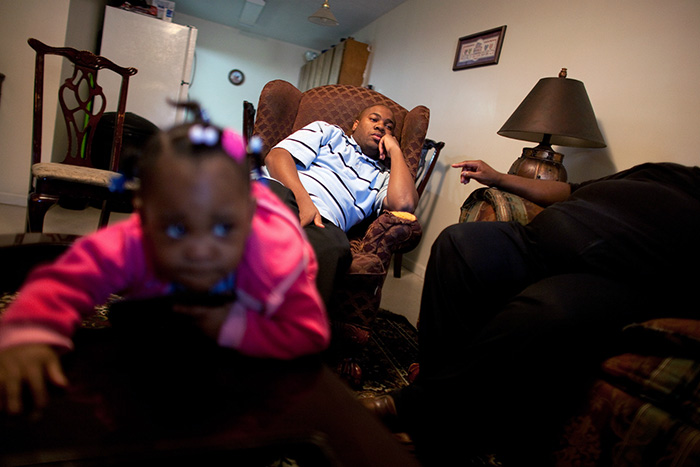HOLLANDALE, Miss. – For a few nights earlier this year, 24-year-old Quincy Mackin slept with his high school diploma hugged up under his chin. No surprise, perhaps, when you learn that Mackin didn’t receive the document until last December or that he’d struggled for years to earn it. Or when you realize how the lack of that piece of paper stood between Mackin and the plan he’d clung to for lifting his family out of poverty.
In tiny Hollandale, where Mackin lives, the median per capita income is under $10,000 a year. “This is a good place to: Nowhere,” reads an online description of the town, which has a population of 3,000 and three schools, two of them rated “failing” by the state Department of Education. Almost no one here holds a college degree.
Mackin intended to change that, at least for his family. He would graduate from Simmons High (which bills itself as a place where “students come first, last and always”), enroll in a pre-nursing program nearby and then transfer to Morehead State University in Kentucky for a nurse practitioner’s degree. It would put him among the 10 percent of Hollandale residents possessing college-level credentials and could have led to a job earning $70,000 a year.
All but for one small hurdle: the eight parts of speech.
Mississippi requires graduating high school seniors to pass a battery of exams in English, math, science and U.S. history, and Mackin had sailed through them all – until English 2. He says that by the end of his senior year, he had failed the test more than a dozen times.
“They called me crazy, dumb, stupid,” he said. Yet Mackin, after being held back in elementary school, had passed through the upper grades so easily that failing the English exam came as something of a shock.
“I had a plan for my whole life that, by 2012, I should be finished with school, and working,” he said, sitting in his mother’s four-room rental, where an abandoned factory dominates the view from the front door. “That plan was broken.”
It is difficult to talk about poverty in Mississippi – and particularly the Delta region – without considering the public education system here. In Hollandale and other low-performing school districts in the area, only 10 percent of eighth graders are proficient in math, and their reading scores are nearly as bad. More than 30 percent of Delta residents do not have a high school diploma or GED, and the state, overall, has the highest child-poverty rates in the nation (three out of every 10 children grow up in families, like Mackin’s, whose annual income is under $22,000).
“Statistically speaking, the Delta is sort of a poster child of what isn’t working as far as giving everyone an equal playing ground and access to opportunity,” said Ron Nurnberg, regional director of Teach for America, which places energetic young professionals into the nation’s worst-performing schools.
Integration of the public education system came relatively late to the Delta, during the 1970s, and it spurred white flight so absolute that today public schools in the region are almost entirely black. “That’s the legacy we’ve inherited,” Nurnberg said, “A separate but very unequal education.”
Quincy Mackin attended two of the 50 lowest-performing elementary and middle schools in the state. Nor did he have much opportunity to get a better education elsewhere. Twenty percent of the very worst schools in Mississippi are in nearby Greenville.
In the Delta, academic deficiencies start in preschool. “There aren’t real standards around what preschools look like here,” Nurnberg said. “Many kids come to school not knowing the alphabet, how to count to 10 – many times, not even their surnames. You see kids in third grade reading two grade levels behind where they should be, and with each successive year they’re dropping behind another half grade level, so it’s no surprise that they’re freshmen getting ready for algebra but still only reading on a third- or fourth-grade level and they’re not prepared for algebra content. The level of expectation is not necessarily all that high.”
Last summer, despite dismal test scores in Greenville public schools, the district enrolled only 5 percent of its 6,900 students in a summer remedial program. “Basically, it was just to get them from the F to at least the D- range so they could be advanced to the next grade,” Nurnberg said.
Pete Smith, a spokesman for the Mississippi Department of Education, said students get remedial coaching when budgets can withstand it.
“Of course, we’re in tight times now,” he said. “The number of students we can take is dependent on the amount of funds that we have.”
Teach for America, meanwhile, has brought thousands of new teachers into Delta schools. The problem is that, energetic and high-performing as they may be, almost all leave after their two-year contracts are up. In Greenville, more than 10 percent of the high school teaching staff is made up of these short-timers.
“These are teachers who don’t have a clue about our culture,” said Tinsa Hall, whose daughter twice failed the algebra exam at Greenville High and received no extra help for six months. “They don’t understand where these kids are coming from, but it doesn’t matter to them because they’re here and then they’re gone.”
Race pervades almost every discussion of public education here, and Hall cannot help noting, “Nine out of 10 of our white teachers, their children go to private school. To me, that sends a message.”
Meanwhile, her 18-year-old son, Byron, is preparing to graduate and utterly uninspired to do anything further with his life. In response to his mother’s prodding, he shrugs and says he might join the Army. He told her flat-out that he was not interested in college.
Though Byron had passed all of his classes and exams with ease, school counselors decided he was not “college material,” his mother said. Nor did they suggest alternative programs. The one visit he had at home, from two Army recruiters, Hall arranged herself.
“I feel like they’re not doing half of what they should be,” she said of the educators. “If you don’t have a parent or advocate to constantly push for your child, it just doesn’t happen.”
While Byron was slouching through school, Quincy Mackin, back in Hollandale, was on his 11th round of trying to pass the English 2 exam. After principal Roger Liddell told him that he had failed again and was ineligible to march at graduation, Mackin nearly broke down.
“I went into a real deep depression,” he said. “A lot of folks didn’t know I was 21. Twenty-one when I finished high school! I was the oldest student in the Hollandale school district and it really hurt that I’d stayed in school all these years and still couldn’t march with my class.”
Teachers had advised him to give up and get a GED, but Mackin refused. He was no high school dropout. He just wanted to pass the test. People began telling him that his options were closing down, that he was too old to keep trying.
The reason he persisted was sitting then on the couch to Mackin’s left. His mother, Gwen, her hands gnarled from rheumatoid arthritis, her heart strained with pulmonary hypertension and her body weakened by lupus, looks considerably older than her 44 years. Unable to afford a car and living in a rural area without public transportation, she depends on family and friends for rides to her weekly doctor’s visits. Often, she misses appointments.
Most of her adult life, Gwen worked cleaning and boxing catfish. Before that, it was check-out jobs at local convenience stores. Sometimes she found work as a substitute teacher. But illness has kept her homebound since 1996, and Gwen survives now on a $708 monthly Social Security check, plus food stamps and Medicaid. From time to time, the water, lights, gas or telephone are turned off until she can pay the bills again.
Mackin had vowed to help. With his dream of a nursing career on the wane, he got a job as a $6-an-hour grocery store bagger, but was laid off last December.
That was just about the time he decided to face the English 2 test one last time. A retired teacher had suggested that the stumbling block might be something basic, essentially fundamental, and they worked backward through his academic career until Mackin hit on it: the eight parts of speech, a lesson he’d failed to grasp in elementary school that had handicapped him ever since. They drilled subjects, predicates, verbs and modifiers; then Mackin walked into the exam room again.
“I finished that test at 12:37 on December 4, 2009,” Mackin recalled. “And on January 4, at 10:34 a.m., they called me and said, ‘You passed.’”
He’d earned a 304, four points above the cutoff, though he says that learning basic grammar has changed the way he reads everything – including official documents. “That’s my pride and joy right there,” Mackin said, gazing at the leather-bound diploma. “I worked real hard for it.”
On March 4, Mackin learned he’d been accepted into a pre-nursing program, and a month later he was sitting in class, pursuing his dream. “I got class tonight,” he said, hurrying off the phone to prepare.


